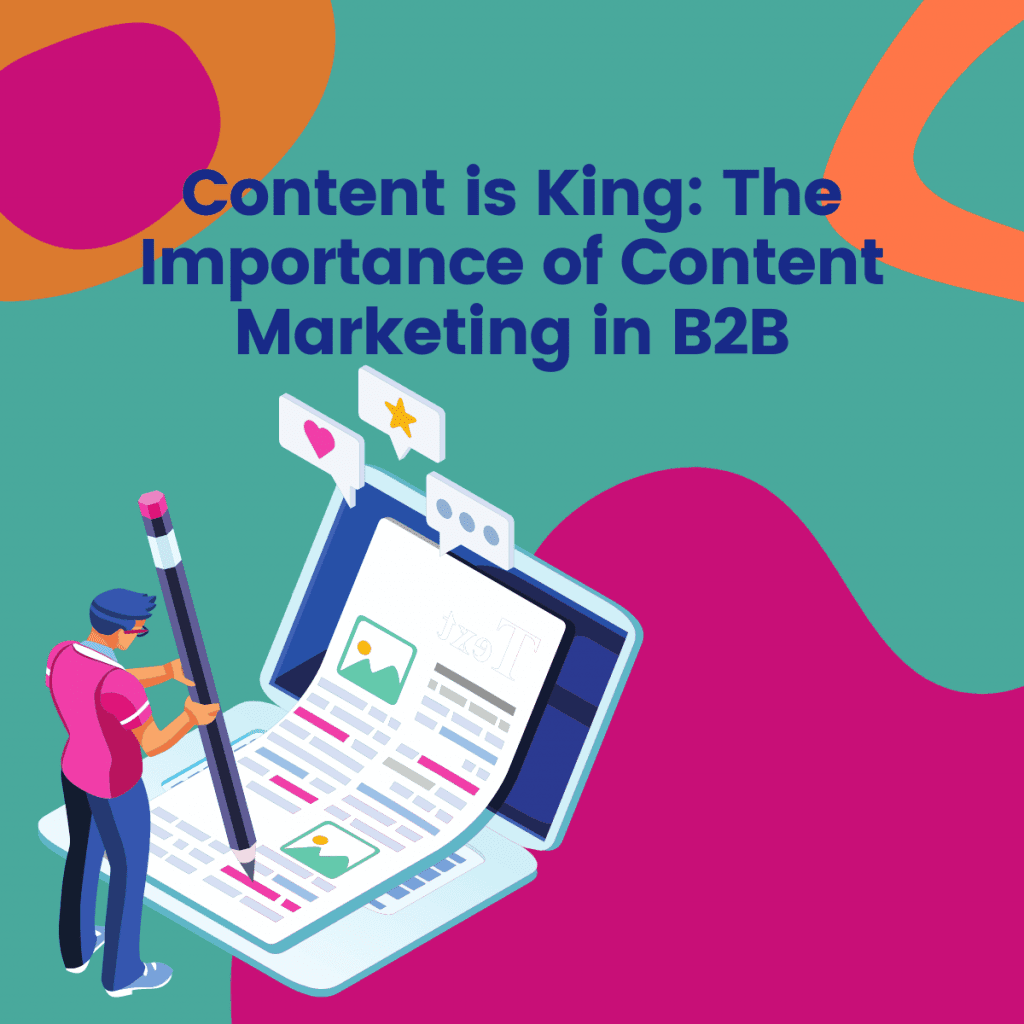Content is King: The Importance of Content Marketing in B2B

Are you a B2B marketer struggling to attract and engage your target audience? Do you find it difficult to stand out in a crowded market and make a lasting impression on your prospects?
If so, then you need to pay attention to one of the most important aspects of modern marketing: content.
In the digital age, content is king, and it has become the driving force behind successful B2B marketing strategies. From social media posts to blog articles, videos, whitepapers, and more, content marketing has the power to capture your audience’s attention, build trust and authority, and ultimately, drive revenue for your business.
In this blog post, we’ll explore the importance of content marketing in B2B and will help you to create compelling content that resonates with your target audience. So, let’s dive in and discover the power of content marketing!
What is Content Marketing in B2B?
Content marketing is the practice of creating and sharing valuable content with the goal of attracting and retaining a specific target audience. This approach focuses on building relationships with customers by providing them with useful and relevant information that can help them make informed decisions.
In B2B marketing, content can take the form of case studies, whitepapers, blogs, webinars, and other formats that address the needs and challenges of a business audience.
Difference between B2C and B2B Content Marketing
While B2C and B2B content marketing share similar principles, there are some key differences. B2C content marketing is typically focused on driving immediate sales and is often geared towards a wider audience. B2B content marketing, on the other hand, is more focused on building relationships with a smaller, targeted audience that is likely to make high-value purchases. B2B content marketing is more focused on providing valuable information and resources that help businesses solve problems and make informed decisions.
Going Virtual: The Shift to Online Selling
Remote selling has become increasingly popular in recent years, with businesses leveraging digital technologies to reach customers. The COVID-19 pandemic has only accelerated this trend as face-to-face interactions became difficult or impossible. This approach offers several advantages, including the ability to reach a wider audience, increased efficiency, and reduced costs.
One of the biggest advantages of remote selling is the ability to reach customers from anywhere in the world. This is particularly important for businesses that operate in multiple locations or have a global customer base. With digital technologies, sales teams can easily connect with customers in different time zones, eliminating the need for expensive travel and in-person meetings.
However, remote selling also presents some challenges, such as the need for sales teams to have the right tools and training to effectively engage with customers remotely. This includes having access to the right technology, as well as the ability to communicate effectively and build relationships virtually. Overall, the move towards remote selling is a trend that is likely to continue in the years to come.
Why Content is King in B2B Marketing?
In B2B marketing, content is king and is considered very important for several reasons.
1. Educating Customers
It educates customers about the benefits and value of a product or service. Customers today are more informed than ever before, and they expect businesses to provide them with the information they need to make informed decisions. Content marketing provides businesses with an opportunity to educate their audience and demonstrate their expertise and knowledge.
2. Trust Building
Content marketing helps to build trust and credibility with potential customers. By providing valuable insights and information, businesses can establish themselves as trusted authority in their industry. This, in turn, can help to reduce customer scepticism and increase the likelihood of making a sale.
3. Leadership
Content marketing is essential for creating thought leadership. By consistently providing valuable and insightful content, businesses can position themselves as thought leaders in their industry. This can help to attract new customers, retain existing ones, and drive more traffic to their website.
4. Website Traffic
Content marketing has a significant impact on search engine optimization (SEO) and website traffic. By creating high-quality, valuable content, businesses can improve their search engine rankings, driving more traffic to their website and increasing their visibility online.
How to Leverage Content Marketing in B2B?
If you’re a B2B business looking to leverage content marketing, here are some key steps you can take:
1. Identifying Target Audience
The first step in developing a successful content marketing strategy is to identify your target audience. Who are they? What are their pain points and challenges? What information do they need to make informed decisions?
2. Content Strategy
Lorem ipsum dolor sit amet, consectetur adipiscing elit. Ut elit tellus, luctus nec ullamcorper mattis, pulvinar dapibus leo.
3. High-Quality Content
The next step is to create high-quality, valuable content that resonates with your audience. This can take the form of blog posts, case studies, whitepapers, videos, webinars, and more. Your content should be informative, engaging, and provide value to your audience. Once you’ve created your content, it’s essential to promote it effectively. This can involve using social media, email marketing, and other channels to distribute your content and reach your target audience.
4. Analyzing Results
To ensure that your content marketing efforts are effective, it’s important to measure and analyze your results. This can involve tracking metrics such as website traffic, engagement rates, and conversion rates. By analyzing your results, you can identify what’s working well and what needs improvement, allowing you to refine your content marketing strategy over time.
5 Most Effective Strategies of Content Marketing
Building trust is very necessary for B2B marketing, and content marketing can help businesses to establish themselves as trusted authorities in their industry. Some effective strategies of content for building trust include:
1. Case studies
Case studies provide real-world examples of how your product or service has helped other businesses. They demonstrate the value you can provide to potential customers and can help to build credibility.
Example
Hootsuite, a successful B2B company in the social media management platform industry, has utilized Semrush for content marketing. Through Semrush’s tools, Hootsuite was able to identify popular keywords and topics for its blog, produce high-quality content, and differentiate itself from competitors.
Hootsuite’s content marketing efforts have resulted in over 18 million users in 175 countries, 80% of Fortune 1000 companies using their platform, and a highly successful blog with over 400,000 monthly visits and a domain authority of 93.
2. Articles & Blogs
Articles and blogs are excellent ways to share insights, opinions, and expertise on topics related to your industry. By consistently creating high-quality blog content, you can establish yourself as a thought leader and build trust with your audience.
Example
HubSpot has successfully increased its website traffic through its content marketing strategy, particularly through its blog articles. As of 2021, the blog had over 7 million monthly visitors and 400,000 email subscribers.
HubSpot’s commitment to creating high-quality, informative content has been recognized by the Content Marketing Institute, and its content marketing efforts have generated over 30,000 leads per month.
3. Lead Generation
To increase lead generation, focus on the benefits of your products or services. Use lead magnets like white papers, infographics, and ebooks. Gate the content to gather contact details from interested leads. Your sales team can follow up with these leads to continue the sales process. This approach can help you generate more leads and drive revenue growth.
Example
Salesforce has successfully increased its sales through lead generation. They generate more than 20,000 leads per month through various marketing channels, including content marketing, paid search advertising, social media advertising, and targeted email campaigns.
Their success in lead generation is evident in their 43% increase in leads and 25% increase in sales resulting from their paid search campaigns, as well as their 55% increase in website traffic and over 6 million page views per year resulting from their content marketing efforts.
4. Webinars and Podcasts
Webinars and podcasts are engaging formats that allow you to share valuable insights and expertise with your audience. They can help to establish you as a thought leader and build trust with potential customers.
Example:
HubSpot has successfully increased its sales through webinars and podcasts. HubSpot’s webinar program, which began in 2010, has generated over 104,000 registrants and 20% of new contacts became qualified leads. The company’s podcast program, “The Growth Show,” has generated over $1 million in revenue since its inception in 2013 and has attracted over 5 million listens.
The success of HubSpot’s webinars and podcasts can be attributed to their focus on providing valuable content to their audience. By creating informative and engaging content, HubSpot has been able to attract new leads and convert them into customers, resulting in over 100,000 customers and $883.3 million in revenue in 2020.
5. Videography
Creating engaging videos can be an effective way to showcase your products or services, share your brand story, and build trust with your audience. Whether it’s a product demo or a behind-the-scenes look at your business, video content can be a powerful tool for building trust and establishing your business as a leader in your industry.
Example
Dropbox successfully increased its sales through video marketing campaigns. In 2012, their campaign included animated explainer videos showcasing their cloud-based file-sharing platform for businesses, resulting in a 10% increase in signups. Their 2014 campaign, featuring short films highlighting real creative professionals using Dropbox, resulted in a 25% increase in signups and a 15% increase in daily active users.
Dropbox’s effective use of animated explainer videos and emotional storytelling helped increase brand awareness and highlight the benefits of its platform for businesses and creative professionals. This success demonstrates the effectiveness of using videos as a marketing tool for B2B companies.
Conclusion
In conclusion, content is the undisputed king of the digital marketing realm, and B2B companies that want to thrive in today’s competitive landscape must prioritize their content marketing strategy. By creating high-quality, relevant, and engaging content, B2B businesses can attract, engage, and convert their target audience, establish themselves as thought leaders in their industry, and ultimately drive business growth.
Achieve Your Marketing Goals
At De Digitizers, we understand the power of content marketing and have helped numerous B2B clients achieve their marketing goals through our proven strategies and tactics. Whether you need help with content creation, distribution, or measurement, our team of experts can provide you with customised solutions that meet your unique needs and objectives.
So, if you’re ready to take your B2B content marketing game to the next level, don’t hesitate to get in touch with us today. Let’s work together to create content that not only captivates your audience but also drives real business results. Contact us now to schedule a consultation!





















